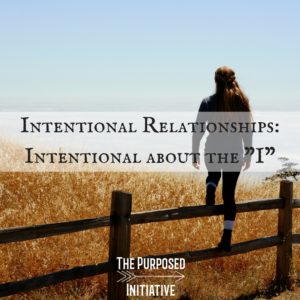
Imagine scrolling through an online dating site (or swiping through an app if that’s more your style) and finding a profile that reads something like this:
Hi, I’m Sam, I’m 25 and just out of a long term relationship which didn’t work out because they said I was too needy. Looking for someone who can love me while I’m down and help pick me up again. I’ve been told I can rub people up the wrong way but I’m happy with who I am and won’t be changing anything for anyone so you’ll need to accept that. I really don’t think I have any faults and I get things right all the time, but if I do need help I need someone who can be there when I need them not make me wait. If you think you are the person for me feel free to send me a message, if I agree I’ll get back to you when I can.
If most of us read a profile like that I reckon we’d keep scrolling (or swiping) without a second thought. And whilst it may seem extreme and not something anyone would actually post, I believe that there are a lot of people who go looking for new relationships whilst holding one or more of these beliefs. People who are not good at being intentional about the “I”.
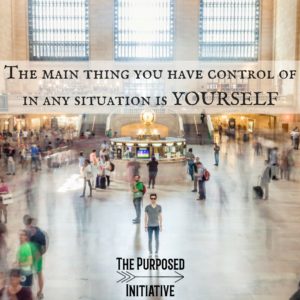 To start a relationship series talking about focusing on ourselves may seem like an odd way of doing things, but bear with me. There is a lot of information out there which tells us we need to look after ourselves first and just do whatever feels right, but when it comes to information about relationships most of it focuses on the other person. It may tell us how to connect with the other person, how to meet their needs, how to address issues with them or how to get them to change their behaviour. But when we look at the factors involved in healthy relationships that we talked about last week, the “I” the “You” and the “Us”, the factor we have the biggest control over is the “I”. Let’s look at three ways we can be intentional about the “I”
To start a relationship series talking about focusing on ourselves may seem like an odd way of doing things, but bear with me. There is a lot of information out there which tells us we need to look after ourselves first and just do whatever feels right, but when it comes to information about relationships most of it focuses on the other person. It may tell us how to connect with the other person, how to meet their needs, how to address issues with them or how to get them to change their behaviour. But when we look at the factors involved in healthy relationships that we talked about last week, the “I” the “You” and the “Us”, the factor we have the biggest control over is the “I”. Let’s look at three ways we can be intentional about the “I”
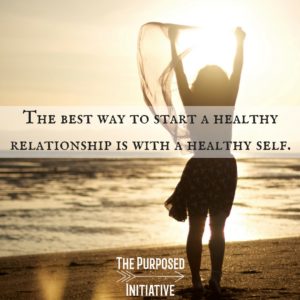 Self-care – This is not self-care as in only caring about yourself, or being able to shower and brush your teeth, but self-care as in being able to look after your own well-being. The best thing we can bring to a relationship to give it a healthy foundation is a healthy self. This isn’t about being perfect or issue free, but it’s about being able to maintain our own emotional and personal well-being in healthy and constructive ways. Self-care means knowing the things that drain you the most, and the things that help you recover. Self-care means knowing what your boundaries are and how you can maintain them. Self-care means knowing the balance between being able to be independent and do things yourself, and knowing when to seek help from others. When we care for ourselves we create a solid foundation for connecting with others and being able to engage in the next two areas, self-reflection and self-growth.
Self-care – This is not self-care as in only caring about yourself, or being able to shower and brush your teeth, but self-care as in being able to look after your own well-being. The best thing we can bring to a relationship to give it a healthy foundation is a healthy self. This isn’t about being perfect or issue free, but it’s about being able to maintain our own emotional and personal well-being in healthy and constructive ways. Self-care means knowing the things that drain you the most, and the things that help you recover. Self-care means knowing what your boundaries are and how you can maintain them. Self-care means knowing the balance between being able to be independent and do things yourself, and knowing when to seek help from others. When we care for ourselves we create a solid foundation for connecting with others and being able to engage in the next two areas, self-reflection and self-growth.
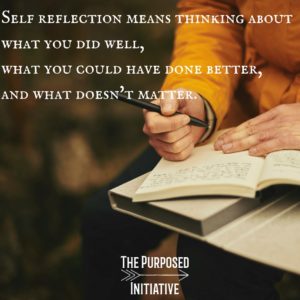 Self-reflection – Self-reflection helps us to identify our strengths and our areas for growth. It helps us to see where we might have wronged someone and how we can do things better next time. Self-reflection helps us understand our impact on others, and their impact on us. There is a balance to self-reflection: too much and we just end up navel gazing and not putting anything into practice, not enough and we just barge through life ignorant to our impact on the world around us. Self-reflection is a skill that we need to practice and work on to find a healthy medium, and it is important that self-reflection does not simply become self-assurance or self-abuse. Healthy self-reflection means allowing ourselves the time to consider situations or events and evaluate what we did well, what doesn’t matter and what could have been done better. Good self-reflection sets us up for the next area, self-growth.
Self-reflection – Self-reflection helps us to identify our strengths and our areas for growth. It helps us to see where we might have wronged someone and how we can do things better next time. Self-reflection helps us understand our impact on others, and their impact on us. There is a balance to self-reflection: too much and we just end up navel gazing and not putting anything into practice, not enough and we just barge through life ignorant to our impact on the world around us. Self-reflection is a skill that we need to practice and work on to find a healthy medium, and it is important that self-reflection does not simply become self-assurance or self-abuse. Healthy self-reflection means allowing ourselves the time to consider situations or events and evaluate what we did well, what doesn’t matter and what could have been done better. Good self-reflection sets us up for the next area, self-growth.
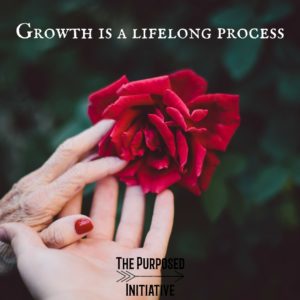 Self-growth – From the moment we are born, growth and development are indicators of health and well-being. Growth and development are just as important for adults as they are for children, and yet sometimes as adults we get so comfortable in ourselves that we stop growing. This is not healthy. None of us are perfect, none of us know everything or get things right every time. In order to be healthy people we need to be constantly growing and learning. It is important that we constantly seek to grow in ourselves so that we don’t get stuck. Self-reflection helps us identify areas we need to improve on, self-growth is us making the effort to work on those areas. It may be breaking habits, building new ones, learning new skills, or expanding our knowledge, but whatever it is we need to keep growing in order to keep living life to its fullest.
Self-growth – From the moment we are born, growth and development are indicators of health and well-being. Growth and development are just as important for adults as they are for children, and yet sometimes as adults we get so comfortable in ourselves that we stop growing. This is not healthy. None of us are perfect, none of us know everything or get things right every time. In order to be healthy people we need to be constantly growing and learning. It is important that we constantly seek to grow in ourselves so that we don’t get stuck. Self-reflection helps us identify areas we need to improve on, self-growth is us making the effort to work on those areas. It may be breaking habits, building new ones, learning new skills, or expanding our knowledge, but whatever it is we need to keep growing in order to keep living life to its fullest.
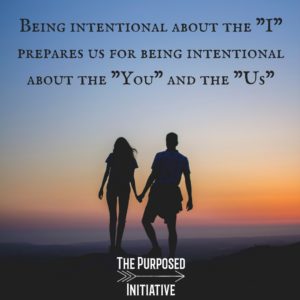 So how does all this “self-stuff” help our relationships? What does being intentional about the “I” actually achieve? Having good self-care puts us in a good position to enter a healthy relationship because we are able to manage ourselves in a healthy way so we are emotionally available and responsive for the other person. Self-reflection helps us to have healthy understanding of our impact on others and their impact on us. It also helps us to know what we need to do when times are tough because we understand what we contributed to the situation and what we can do about it. Self-growth keeps us learning and developing so as the relationship changes over time we can be as prepared as possible for whatever happens. In these ways, being intentional about the “I” puts us in a better position to be intentional about the “You” and the “Us” that we will look at over the next couple of blogs.
So how does all this “self-stuff” help our relationships? What does being intentional about the “I” actually achieve? Having good self-care puts us in a good position to enter a healthy relationship because we are able to manage ourselves in a healthy way so we are emotionally available and responsive for the other person. Self-reflection helps us to have healthy understanding of our impact on others and their impact on us. It also helps us to know what we need to do when times are tough because we understand what we contributed to the situation and what we can do about it. Self-growth keeps us learning and developing so as the relationship changes over time we can be as prepared as possible for whatever happens. In these ways, being intentional about the “I” puts us in a better position to be intentional about the “You” and the “Us” that we will look at over the next couple of blogs.

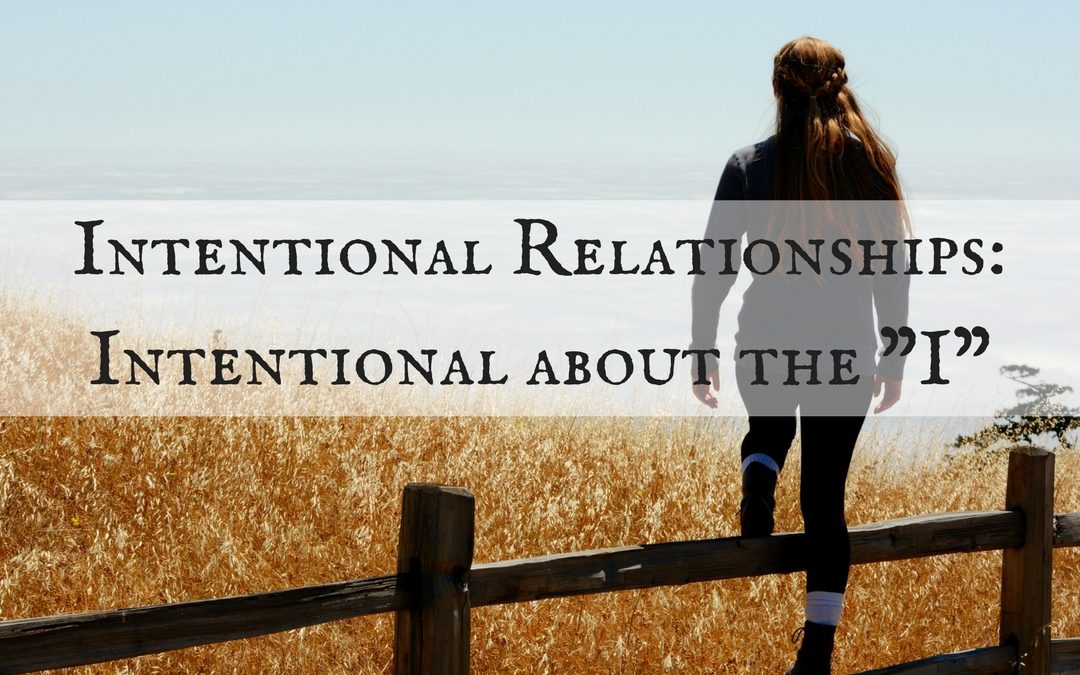
I could not refrain from commenting. Well written! http://bing.net
Thanks!